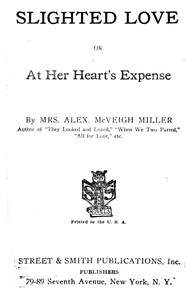Slighted Love or At Her Heart's Expense by Mrs. Alex. McVeigh Miller
FIRST CHAPTERROMANCE
7/22/20257 min read


Originally Published: October 27, 1908
Genres: Romance
Dime Novel Bibliography: https://dimenovels.org/Item/1765/Show
Goodreads link: https://www.goodreads.com/book/show/237619279-slighted-love
Gutenberg link: https://gutenberg.org/ebooks/76413
Chapters: 32
CHAPTER I
A MOTHER’S CONFESSION
Italy Vale! When you heard her name you associated it with blue skies, with orange-groves, and rippling streams; when you saw her face you thought of music and poetry and flowers; of dusky pansies like her somber eyes; of pale-pink roses like her cheeks; of scarlet geraniums like her lips; of young palm-trees that were not more graceful than her slender form, and of the purple bloom of the grape that seemed to linger on her dark, waving tresses—but it was not beneath tropic skies you found her, but on a flat, sandy, wind-swept beach of bleak Massachusetts, at Winthrop-by-the-Sea, a brilliant, dusky-eyed, foreign-looking girl, like some rare-plumaged, tropical bird alighted on an alien shore.
She was young, she was maddeningly lovely, this girl, and but a few months before she had knelt beneath the blossoming limes in an old Italian garden, and looking up with dark, pathetic eyes into the pale, fair face above her, had murmured anxiously:
“Mama, why do we lead so lonely a life? Why do people seem to shun us? What have we done?”
The mother’s soft blue eyes had filled with tears as she faltered:
“So you have seen it, my darling? I can no longer hide from you our desolation.”
“No, Mama, for now I am seventeen years old, and can reason quite like a woman. I have seen what I have told you—that we two are alone in the world together, friendless and seemingly shunned. We rove from clime to clime like two restless ghosts, yet everywhere some dark shadow of destiny follows us. We seem to be known and remarked even in places that are strange to us. As for you, I comprehend that you are bitterly unhappy, for I have never seen a smile upon your lips. Mama, why is it so? Why are we branded and set apart from the rest of the world?”
The blue-eyed mother sobbed bitterly:
“The moment I have dreaded so long has come at last. I must confess the truth to my child. God grant her strength to bear the cross.”
She kissed the eager, upturned face, and her tears fell on its wondrous beauty.
“Oh, my love, my love, how cruel Fate has been to us!” she cried. “I might have been so happy, and you might have reigned like a little queen, but, alas, alas! one dark moment of horror changed both our lives—turned sunshine to darkness, happiness to despair.”
The girl’s white arms, that were a very poem of beauty, encircled the drooping form, the red lips kissed the tears away, and the sweet voice murmured tenderly:
“And you have not deserved that the winds of Fate should blow roughly upon you, my dearest one.”
“God bless you for those loving words, my child. Oh, what a treasure is your faith and love! May they not fail me when you learn of the shadow that has darkened your life and mine,” sighed Mrs. Vale, and, after a moment, she added falteringly:
“Italy, dear, you have been told that your father died in your early childhood, but you have never known what I must tell you now. He—my poor husband—was—murdered!”
“Oh, Heaven!” and Italy’s dark, silken head dropped half-fainting upon her mother’s knee, her eyes closed upon the blue Italian landscape that seemed blurred by a strange mist.
Mrs. Vale’s thin, blue-veined hand fell in tender caressing upon the dark curls.
“Be brave, dear, for there is more to tell, and it is so horrible,” she sobbed. “Oh, Italy, I, your mother, his cherished wife, was accused of my husband’s murder, and tried for my life!”
“Oh, Heaven!” again sobbed the girl, and a convulsive shudder passed over the kneeling form.
Mrs. Vale shuddered, too, and after a moment added brokenly:
“Tried and acquitted.”
Italy half-raised her head, a sob of joy quivering over her lips, but again Mrs. Vale spoke:
“The circumstantial evidence was not strong enough to convict, so the jury acquitted me—but—public opinion adjudged me guilty. The judge and jury that acquitted me were hissed in the crowded court-room. I, too, was hissed as I left it, and ever since that day a malicious clamor has hounded my friendless footsteps through the world.”
She paused, and the low winds sighing through the blossoming limes seemed to echo the despair of her voice.
The dark, silken head lay still upon her knee. Italy was past moving or speaking for the moment, like one tranced in a terrible dream.
The low, sad voice went on:
“I should not have said that I was utterly friendless. My lawyer believed in me, was kind to me. After the trial I stayed for years in Boston, trying to live down the odium of my trial, but all in vain; then this kind friend advised me to come abroad.”
“Mama, then you are an American?” cried the daughter, in surprise.
“Yes, darling, I was born on New England soil, and your father was murdered at our seaside home at Winthrop, near Boston. It is there that his heir lives now.”
“His heir, Mama?”
“Yes, Italy; your father was very rich, but his wealth had come to him through English ancestry, and was strictly entailed on the male issue of the family. You were a girl, so the money went to a very distant cousin, a young man. To me, the hapless widow, and to you, the orphaned daughter, remained only my own small private fortune. With no relatives to turn to, deserted by my former friends, abhorred by the world, I soon became the restless wanderer I am now, but pursued ever by some malignant, unknown foe, who constantly blazons my sad story to the carping world.”
“My dearest one!” cried the girl caressingly, and her tender voice was full of love and sympathy.
The pale, statuesque face of Mrs. Vale quivered with emotion, and she strained the girl to her breast, sobbing convulsively:
“My child, you can never know what I have suffered! Oh, it has been a living death, this life of mine! I loved my husband so dearly that his loss was enough to break my heart; and to think of being accused of his death, to think of living under a ban, acquitted by the law, and judged guilty by popular verdict. Oh, it is enough to drive one mad!” and her slight form shook with heavy sobs as she clung to the beloved child, whose love was all that had saved her from utter misery.
“Mama, who did it? Who killed my father?” cried the girl.
“God alone knows, Italy. There was never any clue to anyone, save some weak evidence that threw suspicion on me. Darling, I have kept all the papers in the case and everything relating to it—kept them for you when you should grow to womanhood. You shall read them tomorrow, you shall know the whole tragic story, so that you may judge the mother you love.”
“My dearest one!” again cried the girl, and they wept together in each other’s arms.
That was long months ago, and now the girl who had knelt weeping in the old Italian garden walked alone on the beach at Winthrop, her dark, eager eyes fixed on a splendid old stone mansion fronting the sea—The Lodge, where her father had been murdered and where his heir now lived.
She went toward the grand villa, her eyes bright and thoughtful, her mind going back to that golden day in Italy when she had heard her mother sob despairingly:
“How could they say I killed him? I loved him so, I loved him so, and all my life is blighted by his loss!”
Her lips were trembling with the sadness of that memory as she went up the broad stone steps to the grand portico dotted with inviting easy chairs, while the broad double doors in front stood hospitably open, giving a view of a magnificent hall paved with cool blue and white tiles, and adorned with gleaming white statues between immense potted plants of tropical beauty. The warm breeze of August, tempered by the cool sea-air, stirred the lance-leaved palms and bright-hued caladiums.
“This would have been my home had my father lived,” she murmured, and then she saw a tall man-servant approach her from the interior of the hall. She roused herself from a fanciful retrospection, and asked for Francis Murray, the master of the house.
“He is in his study. I will be pleased to take your card to him, miss.”
“I have no card. Simply tell him a stranger on important business,” Italy answered, with a strange, defiant uplifting of her slender ebon brows, and she sat down in one of the portico chairs to wait.
In another moment two beautiful young girls and a very stylish young man, all in natty yachting-suits, came sauntering up the broad steps. When they saw Italy sitting there in her simple gray traveling-dress, quiet and yet elegant, they stared in surprise, then nodded courteously, and also took seats at a distance, regarding her with veiled curiosity and admiration, all unconscious that this lovely, foreign-looking girl had brought into the quiet Lodge an element of intense tragedy.
“Ah, Alexie, that was a glorious sail,” cried the young man gaily.
“Alys did not think so,” and the young girl nodded at the other one, whose rosy lips were puckered in an angry pout.
“It was hateful, and I wish you would not tease me, Ralph Allen!” exclaimed the pretty blonde petulantly, just as the servant came back and said:
“Mr. Murray will see you, miss.”
Italy followed him through the wide hall, and the other three gazed after the graceful form in subdued wonder.
“Whew! Alys, how do you like that?” laughed Ralph Allen.
“She is burning with jealousy of the beautiful unknown,” twittered the girl called Alexie, and the hum of their merry badinage followed Italy as she went with an almost tragic face toward the man she wished to see—her distant kinsman.
She found him in a beautiful library, with most exquisite appointments, the large open windows fronting the sea, whose salty breath blew deliciously into the room and mixed with the fine aroma of a cigar that Francis Murray flung away as he rose to meet his stranger guest, the girl with the tropic face and soul, who was bringing at this moment new, strange elements of emotion into his calm, prosperous existence.
Stories
Join us in sharing forgotten literary treasures.
contact
Kayla.Nicole.Draney@gmail.com
